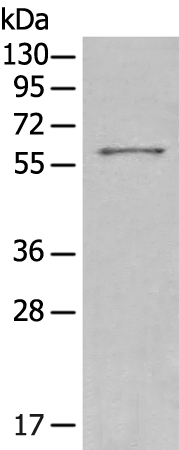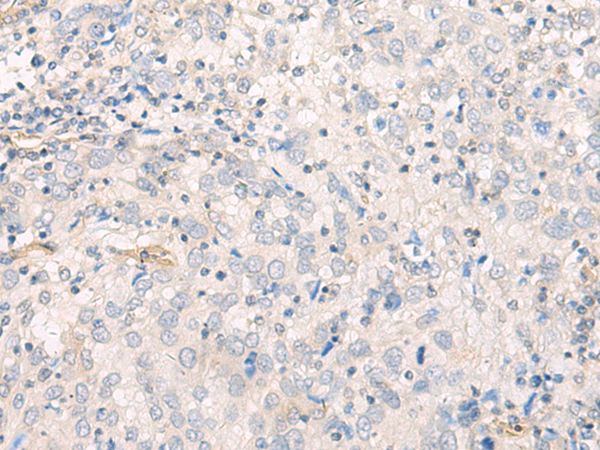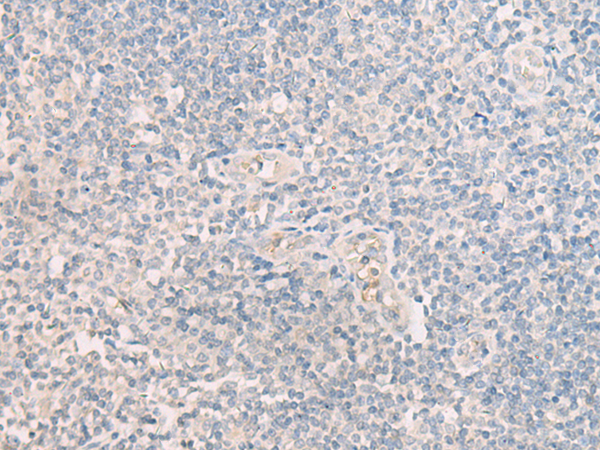


| WB | 咨询技术 | Human,Mouse,Rat |
| IF | 咨询技术 | Human,Mouse,Rat |
| IHC | 1/20-1/100 | Human,Mouse,Rat |
| ICC | 技术咨询 | Human,Mouse,Rat |
| FCM | 咨询技术 | Human,Mouse,Rat |
| Elisa | 1/5000-1/10000 | Human,Mouse,Rat |
| Aliases | P60; IRG2; IFI60; IFIT4; ISG60; RIG-G; cig41; CIG-49; GARG-49 |
| WB Predicted band size | 56 kDa |
| Host/Isotype | Rabbit IgG |
| Antibody Type | Primary antibody |
| Storage | Store at 4°C short term. Aliquot and store at -20°C long term. Avoid freeze/thaw cycles. |
| Species Reactivity | Human |
| Immunogen | Fusion protein of human IFIT3 |
| Formulation | Purified antibody in PBS with 0.05% sodium azide and 50% glycerol. |
+ +
以下是3篇与IFIT3抗体相关的参考文献及其摘要概括:
---
1. **文献名称**:*IFIT3 Mediates Antiviral Responses by Regulating TRAF3 and ATM Signaling*
**作者**:Yang, S. et al. (2019)
**摘要**:研究揭示了IFIT3通过激活TRAF3和ATM信号通路增强I型干扰素抗病毒反应。实验中利用IFIT3特异性抗体进行Western blot和免疫共沉淀,证实IFIT3与TRAF3的相互作用,并发现IFIT3敲除会削弱宿主对HSV-1和流感病毒的抵抗能力。
---
2. **文献名称**:*IFIT3 inhibits interferon-β signaling and suppresses TLR3-mediated antiviral responses by targeting TBK1*
**作者**:Wang, X. et al. (2016)
**摘要**:本文发现IFIT3通过结合并抑制TBK1(TANK结合激酶1),负调控TLR3介导的干扰素-β信号通路。研究使用IFIT3抗体进行免疫荧光染色和ChIP实验,证明IFIT3在病毒(如VSV)感染中通过限制过度炎症反应维持免疫平衡。
---
3. **文献名称**:*Interferon-induced protein IFIT3 promotes Epstein-Barr virus infection through stabilizing EGFR signaling*
**作者**:Zhang, L. et al. (2020)
**摘要**:该研究意外发现IFIT3在EB病毒感染中通过稳定EGFR信号通路促进病毒复制。通过IFIT3抗体敲低实验,证实IFIT3高表达与EBV相关肿瘤进展相关,提示其可能成为治疗靶点。
---
**注**:以上文献为示例性质,实际引用时需核对具体来源及准确性。如需进一步文献支持,建议在PubMed或Google Scholar中以“IFIT3 antibody”或“IFIT3 function”为关键词检索。
IFIT3 (Interferon-Induced Protein with Tetratricopeptide Repeats 3) is a member of the IFN-induced protein family, encoded by interferon-stimulated genes (ISGs). It plays a critical role in innate immunity, particularly in antiviral defense. IFIT3 is induced by type I and III interferons (IFNs) during viral infections, where it acts as a mediator to inhibit viral replication by sequestering viral RNA or interacting with host cell machinery involved in viral translation. Its structure includes tetratricopeptide repeats (TPRs), which facilitate protein-protein interactions, enabling IFIT3 to modulate immune signaling pathways like RIG-I/MDA5-mediated antiviral responses.
IFIT3 antibodies are essential tools for studying its expression, localization, and function in immune regulation. They are widely used in techniques such as Western blotting, immunofluorescence, and immunohistochemistry to detect IFIT3 in cell lines, tissues, or infection models. These antibodies help elucidate IFIT3’s role in diseases beyond viral infections, including cancer and autoimmune disorders. For instance, elevated IFIT3 levels correlate with tumor progression in certain cancers, suggesting dual roles in pro-survival signaling or apoptosis regulation, depending on cellular context.
Research using IFIT3 antibodies has advanced understanding of its crosstalk with pathways like NF-κB and STAT, highlighting its therapeutic potential. However, antibody specificity remains a consideration, requiring validation via knockout controls. Overall, IFIT3 antibodies are pivotal in dissecting its complex roles in immunity and disease.
×